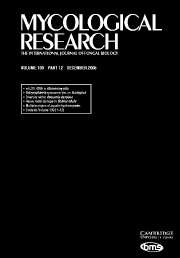Article contents
Development of a DNA probe and a PCR based diagnostic assay for Rhizoctonia solani using a repetitive DNA sequence cloned from a Sri Lankan isolate
Published online by Cambridge University Press: 14 June 2004
Abstract
Rhizoctonia solani is a destructive fungal pathogen of many economically important plants all over the world and the causative organism of sheath blight of rice in many tropical countries including Sri Lanka. A repetitive sequence from the genome of R. solani was cloned and characterized with a view to develop a DNA probe and a PCR diagnostic assay for detection of the fungus. The cloned sequence was 1550 bp long and appeared to be interspersed throughout the genome. The cloned sequence hybridized only to R. solani DNA and was sensitive enough to detect 100 pg of R. solani genomic DNA. PCR primers were designed from the cloned sequence and it was possible to develop a PCR assay for the specific detection of the fungal DNA with 10 pg sensitivity.
- Type
- Research Article
- Information
- Copyright
- © The British Mycological Society 2004
- 1
- Cited by


